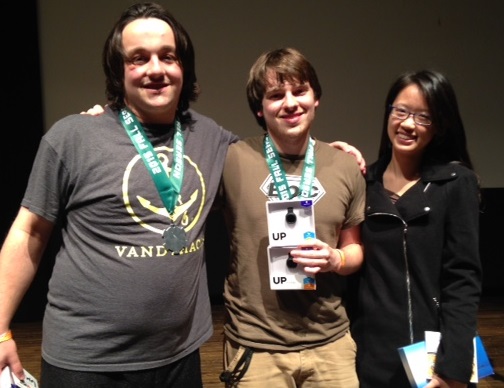
Three sleep-rumpled hackers had an entire room of Rand Dining Hall to themselves early Sunday morning, all the better to walk around testing a marriage between the Project Tango Tablet and Google Street View. They called it, naturally, Tango Street View.
A few key strokes, and Jeff Zotz was holding the tablet in front of him at eye level, walking through the streets of Berkeley, California. A few more taps, and he was strolling through the chairs set up for a Vanderbilt University commencement ceremony.
“It’s a little glitchy, though. We’re working on that,” he said.
“I just fixed it,” teammate Stephen Kinser called out. “Try it now.”
“Nope,” Zotz quipped. “You ruined everything.”
The Middle Tennessee State University team was one of 35 that finished VandyHacks – a three-day event in Sarratt Student Center that ended with an exposition and awards ceremony Sunday afternoon. It attracted 250 participants from Vanderbilt, Purdue University, Georgia Institute of Technology, Rose-Hulman Institute of Technology and a number of other mostly southeastern schools.
Not to be confused with illegal entry into companies’ information networks, this hacking event is an invention marathon, where teams win prizes for coming up with the coolest mobile apps, hardware devices, virtual reality games and more.
The first-place team, all Vanderbilt seniors, created Cubey’s Dungeon, a game where two players use a motion sensor to control characters – one of them releasing monsters and the other trying to defeat them. The winning hackers were computer science majors Jason Mayer, Jonathan Clinton and Mark Schott and computer engineering major Zeke Tan.

Second place went to a Georgia Tech team that created Strum, a guitar application for Sensel Morph hardware, and third place to a Vanderbilt team that created DUB liners, software that generates random lyrics and music. The Hackers’ Choice award, voted on by all the participants, went to Bank Guard, an app developed by Georgia Tech students that stops unauthorized credit card use without having to call the issuing bank.
Prizes included Oculus products, Galaxy phones, tablets and a number of other popular devices.
Many teams were composed of members from different universities. VandyHacks founder and event organizer Sam Pepose, a junior computer science major, said it’s all about collaboration. Months before the event, hackers connected on social media, explaining what they had to offer in terms of expertise.
Major League Hacking, the event consultant, brought a hardware lab for students, and companies such as Tango and Sensel brought hardware for students to use, too, just to see what they’d develop with it.
Pepose said he got the idea for VandyHacks, which launched with a smaller event last spring, by traveling to hackathons across the country ever since he was a high school senior in St. Louis.

“I would go because it was fun to meet new people,” he said. “I also took summer courses at Stanford and saw the hackathons out there. They were so cool, and I wanted to bring the concept to Vandy. It’s just going to keep growing from here on out.”
VandyHacks also offers an opportunity for event sponsors to recruit, and that’s what Vanderbilt alumna Sarah Cannon was doing for Digital Reasoning this weekend. She’s a software engineer for the Franklin-based company.
“We think it’s important to be a part of the community and meet the new people in tech,” Cannon said. “But we’re also hiring interns, and this gives us an opportunity to work with them one on one.”
In addition to vendor and sponsor tables, hackers could take breaks to listen to lectures, compete in a cup-stacking contest and, at 2 a.m. Sunday, break the tension in a room entirely devoted to popping bubble wrap.

And the competition definitely engendered tense moments. For the first day, the Catching Cubes team of Vanderbilt School of Engineering students had nothing. By Sunday afternoon’s packed expo, an eager line of gamers were slipping on virtual reality goggles and comically bumping into people while trying to gather colorful cubes.
“Yesterday, we got down to work, so this was done in less than a day,” said Miti Joshi, a computer science freshman on the team. “We learned a lot. We’re running on two naps since Friday morning, but we really enjoy doing this, so we’re not super tired.”
Sponsors of the event included the Vanderbilt School of Engineering, BNY Mellon, Digital Reasoning, Capital One, AT&T, Yik Yak, Epic, VGT, Lexmark, LeanKit, Launch Tennessee, Digital Ocean, Eventbrite, Metova, Mercury, Lunar Lincoln and Sticker Mule.
Partners in the event were MLH – Major League Hacking, Devpost, Myo, Oculus, Hack Duke ’15 and Hack NC.
Contact
Heidi Hall, (615) 322-6614
Heidi.Hall@Vanderbilt.edu
On Twitter @VUEngineering